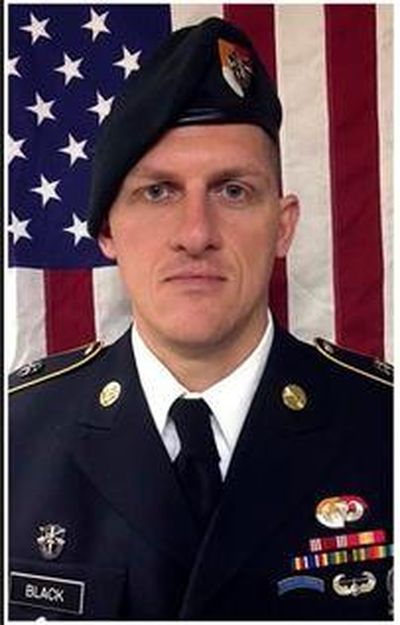Father of Puyallup soldier killed in Niger says officers cited in investigation not at fault for son’s death

The father of a U.S. soldier killed in a devastating ambush in Niger last year said his family does not blame two Army captains that the U.S. military cited for lapses in planning in an investigation summary released Thursday, saying any mistakes did not contribute directly to the death of their loved one.
Army Staff Sgt. Bryan Black, 35, of Puyallup, Washington, was killed Oct. 4 while maneuvering alongside a vehicle as he and his fellow soldiers faced a hail of enemy fire outside the village of Tongo Tongo in an attack that eventually sparked a political firestorm and a monthslong military investigation. Black’s father, Henry, said investigators told him his son repeatedly fired on the enemy with both his service rifle and a grenade launcher before he eventually fell, mortally wounded.
Moments later, two fellow soldiers who had been fighting alongside him, Staff Sgt. Dustin M. Wright, 29, and Staff Sgt. Jeremiah W. Johnson, 39, also were killed, the Pentagon said in the eight-page summary released Thursday. A fourth U.S. soldier, Sgt. La David T. Johnson, 25, was killed less than 30 minutes later and not found for another two days. All four soldiers were stripped of their equipment.
“At some point as they were moving and the vehicle was moving, Bryan was apparently ahead of the vehicle, and he was killed,” Black’s father said. “Dustin and Jeremiah pulled his body behind the vehicle, and they continued to engage the enemy until they were apparently nearly overrun. And then … Jeremiah was hit. Dustin returned to stay with him and fight with him, and they fought together until they died from the wounds they had.”
Senior U.S. military officials said Thursday that all of the U.S. soldiers in the battle fought courageously, and several could receive awards for valor. The Pentagon’s findings found multiple individual and institutional failures created the circumstances in which an American unit could be overrun, but the only individuals specifically cited were the team leader, Capt. Michael Perozeni, and a second Army captain who served as the acting commander of a base nearby.
Perozeni was shot in the battle and tossed from a vehicle, and later identified in congressional testimony by a senior defense official in December. He and the other captain were cited in the investigation for filing an initial concept of operation that said the unit, part of 3rd Special Forces Group, was to undertake a routine reconnaissance patrol.
In reality, the soldiers went on a counterterrorism mission to Tiloa, Niger, near the Mali border, to search for an Islamic State leader, Doundoun Cheffou. He wasn’t there, so the soldiers then met with a Nigerien military leader nearby, the Pentagon said.
Black’s father said that as his son’s unit nearly returned to their base in the Nigerien capital of Niamey, a more senior commander sent them on a third mission. The Pentagon said that decision was made by a more senior commander in Chad. He directed them to undertake a multi-team Special Operations raid to a campsite to which the U.S. government had tracked Cheffou, and eventually to do it on their own when another U.S. team was forced to abort a helicopter raid due to bad weather.
“The retasking is what led to the situation where the ambush took place,” Black’s father said. “I look at the two captains, as far as what caused this, as the nonplayers. Their action had no direct bearing on that.”
Black’s father said he holds the militants who carried out the raid directly responsible and that the more senior commander in Chad had tough decisions to make. Special Operations Command will review whether anyone else should be disciplined.
After recuperating from his injuries, Perozeni visited Black’s widow, Michelle, and offered his condolences and recollections of the battle.
“He has answered all the questions that he could, and we frankly have been very appreciative of him visiting,” Black’s father said.
The family has no ill will toward any other member of the team on the ground.
“We don’t hold them responsible for what happened to our son,” the father said. “As my daughter-in-law would say, we’re just extremely grateful that the rest of them came home.”